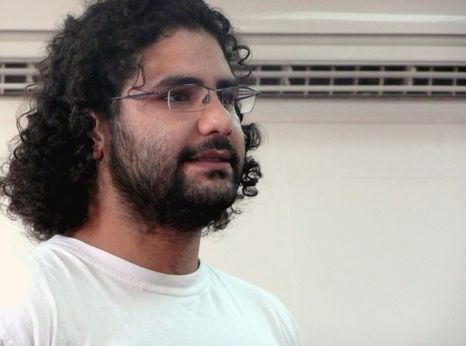Health concerns for activist and lawyer

The detention of Alaa Abdel Fattah and Mohamed el-Baqer came amid the largest arrest campaign since President Abdel Fattah al-Sisi came to power in 2014. On 20 and 21 September 2019, scattered protests broke across Egyptian cities, calling on President al-Sisi to resign. The protests are believed to have been sparked by corruption allegations shared by former army contractor Mohamad Ali who has accused army leaders and the president of wasting public money on building luxury properties.
On 29 March 2019, Alaa Abdel Fattah was released on probation after serving an unjust five-year prison term for participating in a peaceful protest. His probation terms required him to spend 12 hours every night at a police station for five years. On 29 September 2019, Alaa Abdel Fattah did not leave the Dokki police station in Cairo, where he spent his probation. The police told his mother that he was taken by the National Security Agency (NSA) officers to the Supreme State Security Prosecution (SSSP). Later that day, Mohamed el-Baqer entered the SSSP building to represent him. According to their families and friends, Alaa Abdel Fattah and Mohamed el-Baqer’s whereabouts were unknown until on 1 October 2019, when they appeared for the first time since their arrest in Tora Maximum Security Prison 2. The questioning focused on Mohamed el-Baqer’s work and the prosecutor did not provide any evidence against him except an NSA investigation file, which neither he nor his lawyer were allowed to examine.
On 18 March 2020, Alaa’s mother Laila Soueif, his sister Mona Seif, his aunt Ahdaf Soueif and university professor Rabab el-Mahdi – were arrested by security services in front of the Cabinet building in Cairo after they staged a protest demanding the release of prisoners over fears of a coronavirus outbreak in the country’s overcrowded prisons. A prosecutor accused them of “inciting a protest”, “disseminating false information” and “possession of material disseminating false information”. He then ordered their release pending investigations on bail of 5,000 Egyptian pounds (around US$320). Although they made the bail payment the same day, they remained in detention overnight without legal grounds. On 19 March, the authorities transferred Laila Soueif to the SSSP building in New Cairo, where a prosecutor ordered her release on bail of 3,000 Egyptian pounds (around US$190). All four were released that night.
In the aftermath of September 2019 protests, Amnesty International has documented how the Egyptian security forces have carried out sweeping arrests of protesters and rounded-up journalists, human rights lawyers, activists, and political figures in a bid to silence critics and deter further protests. This included 76 arrests across six cities between 19 and 29 September 2019. The Egyptian Commission for Rights and Freedoms, an independent NGO, reported that at least 2,300 have been arrested in relation to the protests. According to lawyers, scores of detainees have been released without questioning, but many others continue to held.
Alaa Abdel Fattah, a well-known political activist and government critic, has been repeatedly arrested in recent years including for his role in the 2011 uprising.
Mohamed el-Baqer is a human rights lawyer and director of Adalah Center for Rights and Freedoms, which he founded in 2014. The Center focuses on criminal justice, the right to education and students' rights.